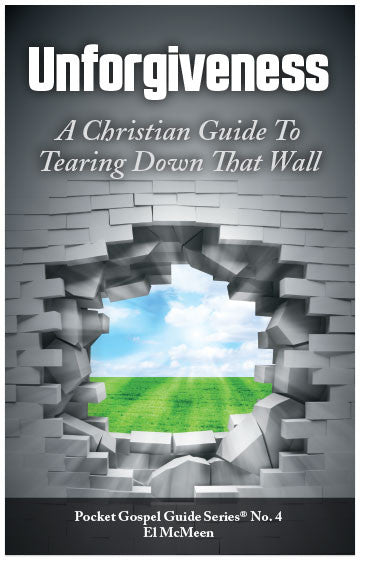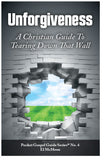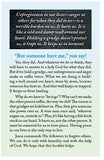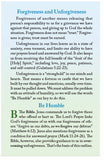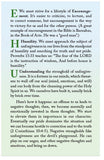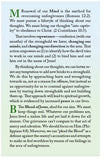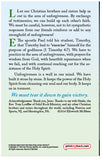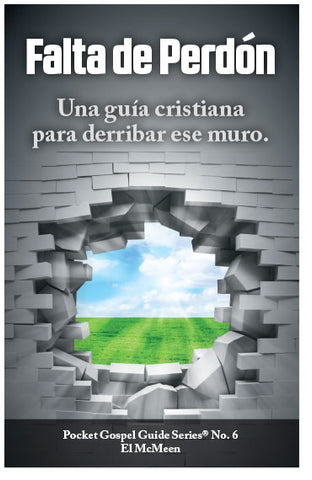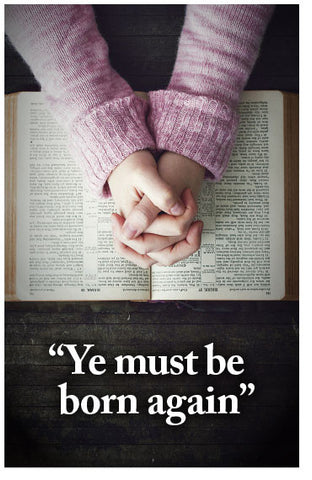Unforgiveness: A Christian Guide To Tearing Down That Wall
Special-Order Folded Tract
 NOTE: This item is custom-printed to order (click for more details).
NOTE: This item is custom-printed to order (click for more details).
This tract is from our print-on-demand library, and is not kept in stock. Select the options below, and we will custom-print a batch just for you. Because this item is custom-printed, you can add your custom imprint to the back page at no extra cost.
- Estimated shipping date: Thursday, March 26 (Click for more details)
- SKU:
- Discounts: Discount coupons do not apply to this item
- Format: Folded Tract
- Size: 3.5 inches x 5.5 inches
- Pages: 6
- Imprinting: Available with 5 lines of custom text
- Version: NKJV
- Returns: Because this item is custom-printed to order, it cannot be returned.
Show all item details
The full text of this tract is shown below in the NKJV version. (Do you want to print this tract in a different version than the one listed? Contact us and let us know what you're looking for—we may be able to create the alternate version for you at no charge.)
Unforgiveness in our lives—anger at others for what they did to us—is a terrible burden on us. It hurts us. It is like a cold and damp wall around our heart. Holding a grudge doesn’t protect us; it traps us. It keeps us in torment.
“But someone hurt me,” you say!
Yes, they did. And whatever we do or think, they will have to answer to a holy God for what they did. But if we hold a grudge, our unforgiveness and anger make us suffer twice. What we are doing is building a wall around our heart, stone by stone, because someone has hurt us. And that wall keeps us trapped. It keeps us from healing.
Why do we have to “let it go”? Why can’t we make the other person suffer, the way we did? The reason is that grudges we hold hurt us. Plus, they give someone else power over us. A wise man once said, “whoever angers us, controls us.” Plus, it’s like having a fish hook stuck in our hand. It hurts us, not the other person. It must be removed for us to have peace. Having peace in our lives is the only way to live.
Jesus commands His followers to forgive others. We can do it only with humility and with the help of God. We hope that this booklet helps.
Forgiveness and Unforgiveness
Forgiveness of another means releasing that person’s responsibility to us for a grievance we have against that person, and giving up to God the whole situation. Forgiveness does not mean “trust.” Forgiveness is given; trust must be earned.
Unforgiveness in our lives leaves us in a state of anxiety, even torment, and limits our ability to have our prayers heard and answered by God. It also keeps us from receiving the full benefit of the “fruit of the [Holy] Spirit,” including love, joy, peace, patience, and self-control (Galatians 5:22-23).
Unforgiveness is a “stronghold” in our minds and hearts. That means a fortress or castle that we have built by our thought and emotions, usually over time. It must be pulled down. We must address the problem with an attitude of humility, so we will use the words “Be Humble” as our key to do this.
Be Humble
B The Bible. Jesus commands us to forgive those who offend or hurt us. The Lord’s Prayer links God’s forgiveness of us with our forgiveness of others: “forgive us our debts, as we forgive our debtors” (Matthew 6:12). Jesus also mentions forgiveness as a condition for answered prayer (Mark 11:24-26). The Bible, however, also provides guidance to us in overcoming unforgiveness. That’s the basis of this outline.
E We must strive for a lifestyle of Encouragement. It’s easier to criticize, to lecture, and to correct someone, but encouragement is the way to victory for us and for the other person. (A great example of encouragement in the Bible is Barnabas, in the Book of Acts. He was a “good man”.)
H Humility. We must approach the subject of unforgiveness in our lives from the standpoint of humility and searching for truth and not pride. Proverbs 15:33 teaches us: “The fear of the LORD is the instruction of wisdom, And before honor is humility.”
U Understanding the stronghold of unforgiveness. It is a fortress in our minds, which threatens to wall off our soul (mind, emotions, and will) and our body from the cleansing power of the Holy Spirit in us. We ourselves have built it, usually brick by brick over time.
Here’s how it happens: an offense to us leads to negative thoughts; then, we become mentally and emotionally invested in those thoughts. We start to elevate them in importance in our character. Eventually our pride dominates the situation and we can become hostile to correction and to the truth (2 Corinthians 10:4-5). Negative strongholds like unforgiveness are the devil’s playground. He can play on our anger, and other negative thoughts and emotions, and bring us down.
M Renewal of our Mind is the method for overcoming unforgiveness (Romans 12:2). We must pursue a lifestyle of thinking about our thoughts. We must bring our thoughts “into captivity” to obedience to Christ. (2 Corinthians 10:5).
That involves repentance—confession (with our mouths) of the stronghold we have; changing our minds; and changing our direction in the area. That action empowers us (1) to identify how the devil tries to work in our minds and (2) to bind him and cast him out in the name of Jesus!
By thinking about our thoughts, we can better resist any temptation to add new bricks to a stronghold. We do this by approaching hurts and wrongdoing towards us, not as a reason for offense, but instead as an opportunity for us to contend against unforgiveness by tearing down strongholds and not building them up. That approach will lead to spiritual growth, which is evidenced by increased peace in our lives.
B The Blood of Jesus, shed for our sins. We must keep things real. Whatever our problems are, Jesus lived a sinless life and yet laid it down for all sinners. Our grievances can’t compare to that act of mercy and salvation. We should focus on Him (Philippians 4:8). Moreover, we can “plead the Blood” as a defense against the enemy’s accusations and attempts to make us feel worthless by reason of our failings in the area of unforgiveness.
L Let our Christian brothers and sisters help us out in the area of unforgiveness. By exchange of testimonies, we can build up each other’s faith. We must be careful, however, not to let sympathetic responses from our friends reinforce or add to any stronghold of unforgiveness!
E The apostle Paul told his student, Timothy, that Timothy had to “exercise” himself for the purpose of godliness (1 Timothy 4:7). We have to practice in the area of unforgiveness, with prayers for wisdom from God, with heartfelt repentance when we fail, and with continual reaching out for the assistance of the Holy Spirit.
Unforgiveness is a wall in our mind. We have built it stone by stone. It keeps the power of the Holy Spirit from cleansing our soul and our body. It keeps us in torment.
We must tear it down to gain victory.
Acknowledgments: Thank you, Jesus. Thanks to my wife Sheila, the Rev. Tony Loeffler of Solid Rock Ministry, and my other Christian brothers and sisters throughout the world, including Newton and Sparta, NJ, and Huntingdon, PA. ©2014 Ellsworth McMeen

